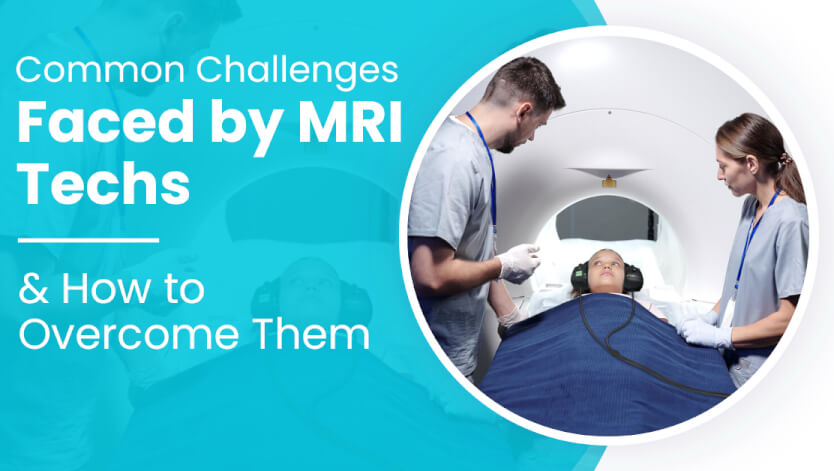Magnetic Resonance Imaging (MRI) technologists play a crucial role in the healthcare industry. They operate big tube-like machines that use a magnetic field and radio waves to create images of patients’ organs, tissue, and bones. However, being an MRI technologist comes with its own set of challenges. In this article, we will discuss some common challenges faced by MRI technologists and how to overcome them.
Challenge 1: Preventing Magnetic Objects from entering the MRI Room
MRI technicians face several challenges when it comes to magnetic objects in the MRI room. The presence of ferromagnetic materials can cause serious safety hazards for patients and staff, as well as damage to equipment.
One of the main challenges is screening patients and visitors for any metallic implants or objects that could be affected by the strong magnetic field of the MRI machine. This includes pacemakers, cochlear implants, aneurysm clips, and other medical devices that may need to be removed or replaced before the scan.
Solution:It is crucial for MRI technicians to take precautions and follow strict protocols to ensure a safe environment for everyone involved. Preventing ferromagnetic objects from entering the MRI room requires careful monitoring of all equipment and supplies brought into the room, as well as enforcing strict policies on what can and cannot be worn by staff members and patients.
Challenge 2: Patient Anxiety
One of the most common challenges faced by MRI technologists is patient anxiety. Many patients may feel claustrophobic or anxious during the procedure due to the enclosed space of the MRI machine. This can lead to involuntary movements, which can cause blurry images or even harm the patient.
Solution:To overcome this challenge, it is essential for MRI technologists to communicate effectively with their patients before the procedure. They should explain what will happen during the scan and reassure them that they will be safe throughout the process. Additionally, providing patients with earplugs or headphones can help reduce anxiety by blocking out loud noises from the machine.
Challenge 3: Equipment Malfunction
Another challenge faced by MRI technologists is equipment malfunction. The MRI machine is a complex piece of equipment that requires regular maintenance and calibration to ensure accurate results. If there is an issue with the machine during a scan, it can cause delays in patient care and potentially compromise their health.
Solution:To avoid equipment malfunction, it is crucial for MRI technologists to perform routine checks on their machines before each scan. They should also report any issues immediately to their supervisor or maintenance team so that they can be resolved promptly.
Challenge 4: Patient Cooperation
MRI scans require patients to remain still for an extended period while inside the machine. However, some patients may not be able to stay still due to physical discomfort or medical conditions such as Parkinson’s disease. Also, MRI scans can offer a unique experience to those undergoing the procedure, sometimes inducing an unusual twitching sensation due to rapidly switched magnetic fields.
Solution:To overcome this challenge, it is essential for MRI technologists to communicate effectively with their patients before the procedure. They should explain what will happen during the scan and ask if there are any concerns or issues that need addressing beforehand. Additionally, providing patients with comfort pads, pillows, or blankets can help make them more comfortable during the scan.
Challenge 5: Patient Health Concerns or Medical Emergencies
While performing an MRI scan, patients may experience a medical emergency such as a seizure, allergic reaction, or cardiac arrest. This can be challenging for the technologist as they must act quickly to ensure the patient’s safety while also maintaining image quality.
Solution:To overcome this challenge, it is essential for MRI technologists to be trained in basic life support and emergency procedures. They should also have access to emergency equipment and be familiar with protocols for handling medical emergencies during scans.
Challenge 6: Language Barriers
MRI technologists may encounter patients who do not speak the same language as them. This can make communication difficult and lead to misunderstandings about the procedure or patient history.
Solution:To overcome this challenge, it is crucial for MRI technologists to work with interpreters or translators when necessary. They should also have access to translated patient information and instructions in multiple languages.
Challenge 7: Time Management
MRI scans can take anywhere from 15 minutes to over an hour depending on the type of scan being performed. This can make it challenging for technologists to manage their time effectively while ensuring that each patient receives high-quality care.
Solution:To overcome this challenge, it is essential for MRI technologists to develop time management skills and prioritize tasks throughout their day. They should also have clear protocols in place for managing scheduling conflicts or unexpected delays.
Challenge 8: Obtaining Quality Images
Obtaining high-quality images is crucial to ensure accurate diagnoses and treatment plans for patients. However, there are several factors that can affect the quality of MRI images, such as patient movement or incorrect positioning.
Solution:To overcome this challenge, it is essential for MRI technologists to have a thorough understanding of anatomy and image acquisition techniques for the images doctors rely on to diagnose the patients. They should also communicate effectively with patients to ensure they understand how to remain still during the scan. Additionally, using immobilization devices such as straps or pads can help reduce patient movement and improve image quality.
Conclusion
Being an MRI technologist comes with its own set of challenges; however, these challenges can be overcome through effective communication with patients, routine checks on equipment maintenance and calibration as well as providing comfort measures like earplugs or headphones when necessary. By overcoming these challenges, MRI technologists can provide high-quality care for their patients while ensuring accurate results from their scans.
Sources
- https://www.coursera.org/articles/mri-technologist
- https://money.usnews.com/careers/best-jobs/mri-technologist
- https://wcui.edu/programs/associate-programs/mri/
- https://www.nibib.nih.gov/science-education/science-topics/magnetic-resonance-imaging-mri
- https://windsorimaging.com/how-does-an-mri-system-produce-a-diagnostic-image/
- https://www.mayoclinic.org/tests-procedures/mri/about/pac-20384768
